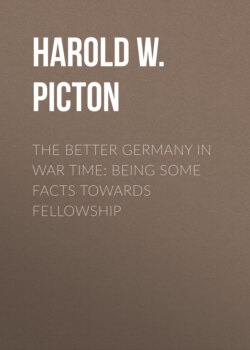Читать книгу The Better Germany in War Time: Being Some Facts Towards Fellowship - Harold W. Picton - Страница 6
На сайте Литреса книга снята с продажи.
Merseburg, Dœberitz.
ОглавлениеTable of Contents
I pass on now to a report made by a United States Official. The American Consul writes from Leipzig under date of November 16, 1914: “On Saturday afternoon, the 14th instant, I visited the military concentration camp near Merseburg, where some 10,000 prisoners of war are interned. The object of my visit was to investigate the claim of a French prisoner that he is an American subject. The result of my observations regarding the welfare and humane treatment of the prisoners at large was a surprise to me. … Separated by nationality, these prisoners are housed in wooden buildings, well built, ventilated and heated. … They sleep upon straw mattresses in well-warmed quarters, and, as far as I could judge, are as well or better housed than labourers upon public works in the United States. The prisoners are fed three times a day. Breakfast consists of coffee and bread. Dinner consists of vegetable and meat, soup and bread, and for supper they are given bread and coffee. I was informed that many of the prisoners have some money, and that they are allowed to buy whatever else they may wish to eat. If I may judge from the mounds of empty beer bottles at hand, there is evidence in support of this statement. The prisoners appeared to be in good health and cheerful, many of them engaging in games and other pastimes.”
The diet described must be frightfully monotonous. Feeding has throughout been one of the German difficulties. “Germany claims to hold 433,000 prisoners of war,” wrote an anonymous American journalist (probably in November, 1914); “the housing and feeding of so great a number must be a tremendous strain upon resources drained by the necessities of war.” The numbers must now exceed two million. The Press article referred to [Misc. No. 7 (1915)] is severe on the misery of camp life, and the verminousness of the men (they were of mixed nationality) in the camp at Döberitz which he visited. (See, however, the further official reports quoted below at p. 9). But the writer does not confine his condemnation to one side. “One hears of battles in which no quarter is granted. There are stories of one side or the other refusing an armistice to permit the other to gather its wounded. Each side is desperately determined to win, and neither is counting the cost. So men must rust in prison camps until the struggle is over.” The monotony in this case seems to have been varied by fights between the prisoners of different nationality, each set considering that the others had not done their part in the war. We need not be contemptuous about that. The monotony of the prisoners’ life must tend to produce the maximum degree of mutual friction. There is absolutely no privacy for the prisoner of war. To be forced to remain, day and night, for months and years in idleness, with a crowd of others, not of one’s own choice is, I believe, one of the psychological factors which make internment (especially to many civilians) decidedly worse than imprisonment in a criminal prison.
